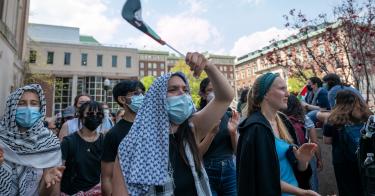College student “encampments” are spreading—and serve as a blatant illustration of the immaturity of this entitled generation of college students.
Want to stage a protest on the sidewalk? Fine. Invite a speaker to support your views? Carry on. Don’t attend a speech you don’t want to hear? Also a protected form of expression.
Run over a security guard, stab another student in the eye, block the hallways inside a building, and pitch tents on a lawn and refuse to move? These are First Amendment violations (and more) and warrant police action, perhaps even suspension and expulsion.
Earlier this week, NPR asked Daniel Diermeier, Chancellor of Vanderbilt University, where he draws the line between free speech and legitimate protest. A group of Vanderbilt students recently “ran over” a security guard, Diermeier said, on their way to occupying an administrative building and refusing to leave. The students sent the guard to the hospital, and his injuries kept him out of work for two weeks. One student broke a window in the building.
>>> Minnesota’s New Academic Standards Seek To Turn Students Into Revolutionaries
NPR called this a “complex” topic because protests have been “central to history-making movements,” but Diermeier was direct: Causing injury and damaging property are not protected forms of speech. When it comes to protests, Diermeier said, “universities will determine the time, manner, and way in which it’s done.”
This is an important message for college officials today as they measure the boundaries of the First Amendment. What started as an encampment at Columbia University last week has spread to a set of student riots on campuses across the U.S. By April 24, students were pitching tents on the grounds of Harvard, the University of Michigan, the University of Texas, the University of Southern California, and more.
These are not peaceful protests. A Jewish student at Columbia was punched in the face, while a Jewish student at Yale was stabbed in the eye. Many rioters are wearing masks and setting up their tents despite warnings that their camps violate university policies. At Emerson, students blocked in a right-of-way near Boston, defying local ordinances (police arrested more than 100 individuals).
Protecting free expression on college campuses is essential to helping students succeed. Students should be allowed to speak and be heard in public areas of school grounds, such as sidewalks and lawns. Expression should not be cordoned off to so-called free-speech zones. As the University of Chicago’s Committee on Free Expression wrote in a statement adopted by more than 100 colleges and universities, it is not a school’s job to protect individuals from ideas with which they disagree.
But no one on campus should be allowed to shout down another individual at a school program, preventing them from delivering a lecture or teaching a class. Neither should individuals be automatically absolved from committing physical assaults or damaging property. College officials must maintain order inside school buildings and on any part of campus where individuals are breaking school codes or violating the law. (The Goldwater Institute is working to enact a reform to help state lawmakers protect expression on college campuses.)
>>> The Next Generation of Marxists Is Marching Through the Institutions
This outbreak of “encampments” on campuses is not an attempt to persuade people with ideas, nor mere efforts to express opinions. These individuals are bullies. They are trying to intimidate others by covering their faces, encircling Jewish students, and blocking access to buildings.
At the same time these rioters threaten those around them, President Joe Biden’s administration is trying to shift students’ tuition costs to taxpayers. The administration is attempting to load billions of dollars in student loans on the backs of voters and families, even after the U.S. Supreme Court rejected an earlier attempt by the administration to do this last year.
Yet what lessons are taxpayers paying for? When Harvard and Columbia officials allow rioters to dominate others, educators are crippling students’ maturation. School administrators such as those at the University of Texas deserve praise for enacting consequences on disruptive individuals. College personnel practice neglect when they allow students to act like children and are implicitly teaching the next generation that being a bully solves your problems.
If Biden’s student loan plan succeeds, taxpayers will inherit this neglect. And inherit a generation of co-workers, voters, and neighbors prepared to crush free speech.
This piece originally appeared in the Goldwater Institute




